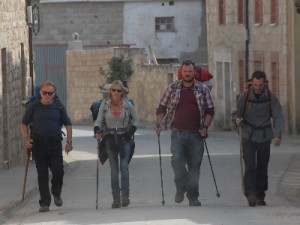previous
More on the pilgrimage to San Juan de Compostela
starting exploration
Thoughts and questions related to the essay “Edna’s List”
- Attached to the essay "Edna’s List"
Why aren’t friendships made on the trail sustained?
Posted April 24, 2012 4:34 pm The 2010 film, The Way, starring Martin Sheen and written and produced by his son Emilio Estevez, is not a good film. The characters are undeveloped, the dialogue cliched, the narrative predictable. But the film does give a very accurate sense of what the pilgrimage looks and feels like. In the film, Sheen plays the aggrieved father who walks the trail on which his son has just died; Estevez makes a few appearances as the deceased son in brief flashbacks. What the film gets right—beyond the beautiful scenery—is the psychological journey that accompanies the physical one. A friend who made the trek confirmed this for me.
The 2010 film, The Way, starring Martin Sheen and written and produced by his son Emilio Estevez, is not a good film. The characters are undeveloped, the dialogue cliched, the narrative predictable. But the film does give a very accurate sense of what the pilgrimage looks and feels like. In the film, Sheen plays the aggrieved father who walks the trail on which his son has just died; Estevez makes a few appearances as the deceased son in brief flashbacks. What the film gets right—beyond the beautiful scenery—is the psychological journey that accompanies the physical one. A friend who made the trek confirmed this for me.
According to him, on the trail groups of largely compatible people form casually, and very quickly strong bonds develop between the members. Generally, people make the pilgrimage with the hope of working something out in their lives, and they invest a lot of time and effort in this pursuit. The days of the pilgrimage are intense, full of expectation, and have an out-of-time quality, since everything in one’s normal life is temporarily abandoned. Group members arrange to meet up in the afternoons but tend to walk alone, so that each person has an unusually large amount of time to think. The result is a unique intimacy between strangers that is sustained over the six weeks or so of the experience. During it, much is exchanged—griefs, disappointments, aspirations, regrets—and often transformations are achieved. All this, comes through in the film.
Curiously, though, the friendships are not usually resumed after the pilgrims return home. The group members exchange addresses but the friendships, like those made in summer camp or on exchange programs abroad, tend to be enshrined in memory rather than incorporated into regular lives. Why is that?
topics: culture
share
 site feed
site feed


